Acer Aspire V3-571G-9435: The Value Proposition
by Jarred Walton on July 4, 2012 4:25 AM ESTAcer V3-571G General Performance
We start as usual with our general performance application benchmarks. We still don’t have quite as many laptops available in our updated Mobile Benchmark Suite as we’d like, and there’s not much point in comparing a full-size notebook with several different models of Ultrabook. We’ve tried to stick with the more meaningful comparisons where possible, but we also wanted to flesh out the charts with additional data points. The result is the following selection of laptops, with their basic specs listed in the table, and as always, should you want to make additional comparisons, head over to Mobile Bench.
| Laptop Configuration Overview | ||||
| Laptop | CPU | Graphics | Storage | Battery |
| Acer Aspire V3-571G | Intel i7-3610QM | GT640M/HD4000 | HDD | 48Wh |
| Acer TimelineU M3 | Intel i7-2637M | GT640M/HD3000 | SSD | 55Wh |
| AMD Trinity Prototype | AMD A10-4600M | HD7660G | SSD | 56Wh |
| ASUS N56VM (Prerelease) | Intel i7-3720QM | GT630M/HD4000 | HDD | 56Wh |
| ASUS Zenbook Prime UX21A | Intel i7-3517U | HD4000 | SSD | 35Wh |
| ASUS G74SX-A2 | Intel i7-2630QM | GTX560M/HD3000 | SSD | 90Wh |
| Clevo W110ER | Intel i7-3720QM | GT650M/HD4000 | Hybrid | 62Wh |
| Razer Blade | Intel i7-2640M | GT555M/HD3000 | SSD | 60Wh |
| Sony VAIO SE | Intel i7-2640M | HD6630M/HD3000 | HDD | 49Wh |
| Toshiba P755D | AMD A8-3520M | HD6620G | HDD | 47Wh |
As we’re starting with PCMark results, we again want to note how much of an impact the presence of an SSD has on the results. It makes most of the comparisons between the HDD and SSD equipped laptops meaningless, but it does serve to drive home the point that for some workloads an SSD will make a huge difference. I switched over to a 240GB SSD for my laptop and Ultrabook use, and whenever I have to use and test a laptop that only has HDD storage (like the Acer V3), the difference is painfully obvious.
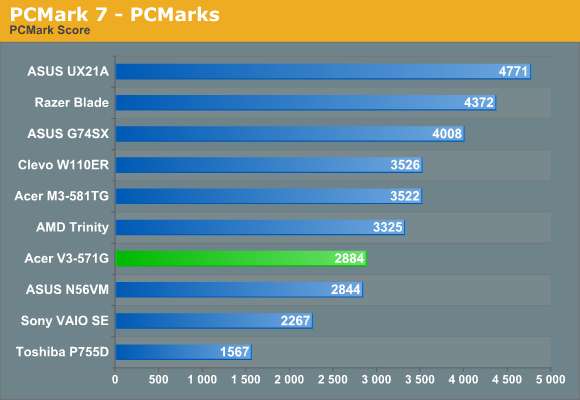
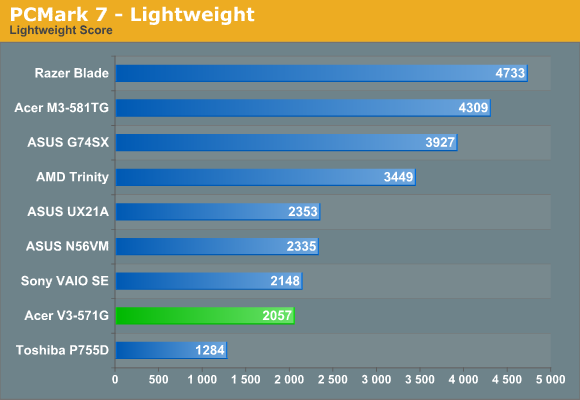
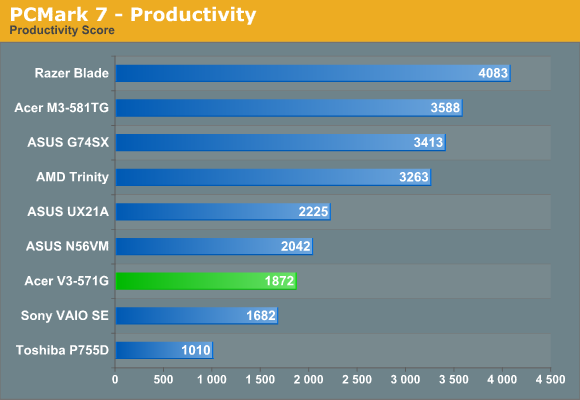
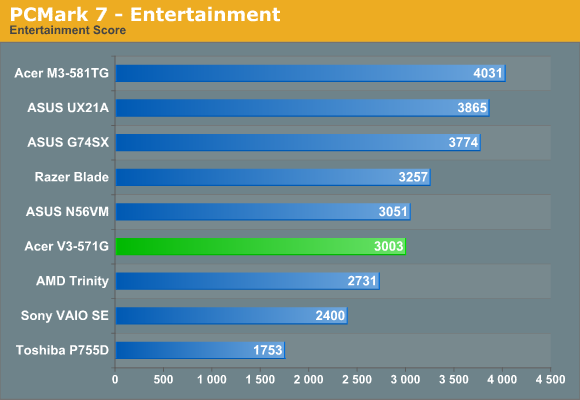
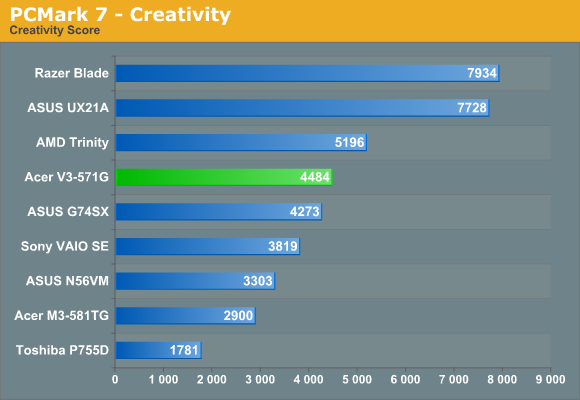
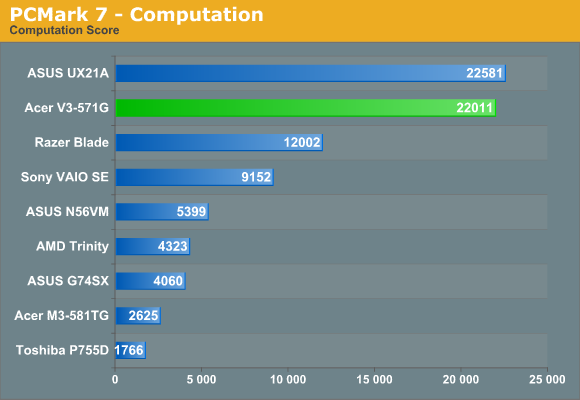
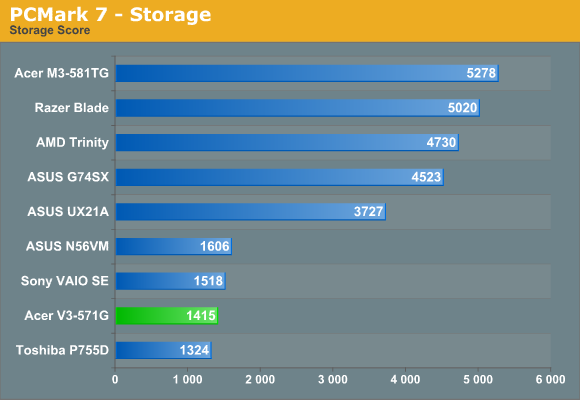
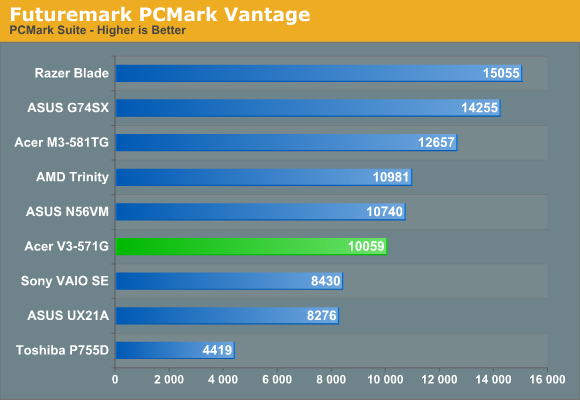
The placement of the Acer V3 in the above charts isn’t very inspiring, but remember what we said about SSDs. Most of the higher scoring laptops feature SSDs and/or slightly faster CPUs. For general use, any of the laptops will be “fast enough”, and as long as you don’t mind waiting during intense periods of disk activity (e.g. initial boot up of the OS and various applications) even the HDD equipped laptops will work well. Still, one look at what an SSD does for the ASUS N56VM might make you consider splurging on better storage system. Acer adds insult to injury here by going with a 5400RPM hard drive, and the only slower Storage score in the charts comes from the Toshiba P755D—which also uses a 5400RPM Toshiba hard drive, not surprisingly.
If we look at the one PCMark 7 test that doesn’t hit storage at all, the Computation suite, we run into a different problem. Here, all of the laptops that support Intel’s Quick Sync technology get a massive performance boost, and the Ivy Bridge processors are basically twice as fast with Quick Sync as Sandy Bridge parts. It makes for yet another lopsided graph, which makes the overall usefulness of the PCMark scores debatable. As long as we understand what the charts represent, however, we can at least use them to gauge relative performance. The basic summary is that, for general use, a moderate CPU (e.g. Trinity, Llano, or Sandy Bridge) with an SSD will offer a better experience than just about any current HDD-based laptop; similarly, if you want to do hardware accelerated video encoding, there’s no beating Quick Sync.
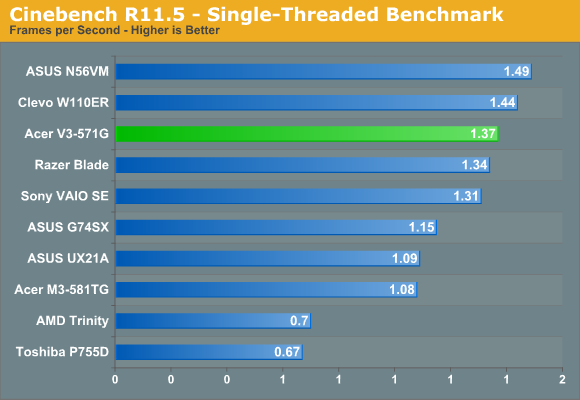
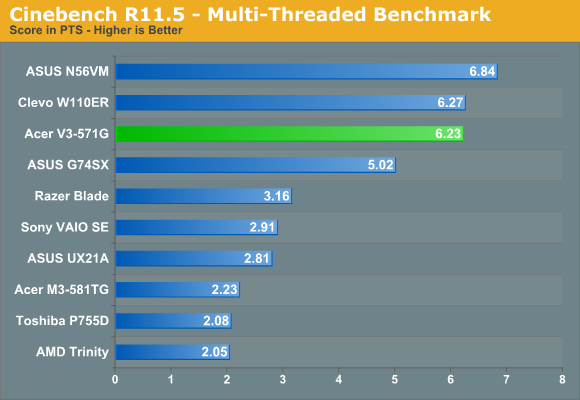
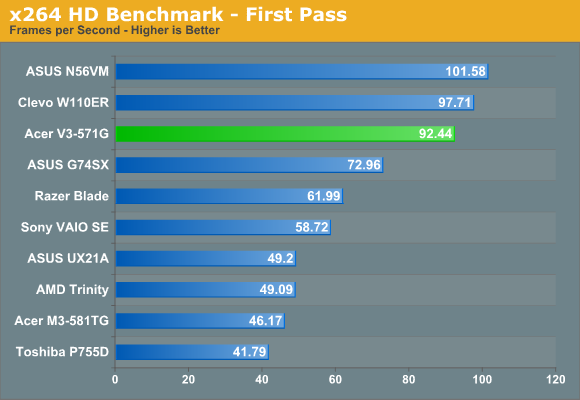
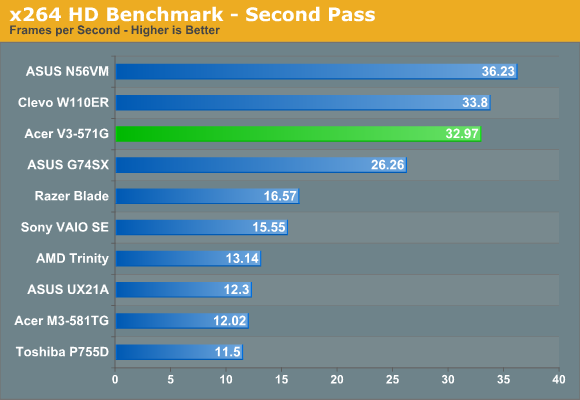
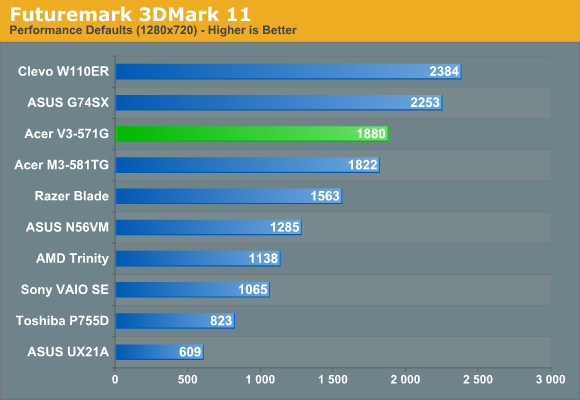
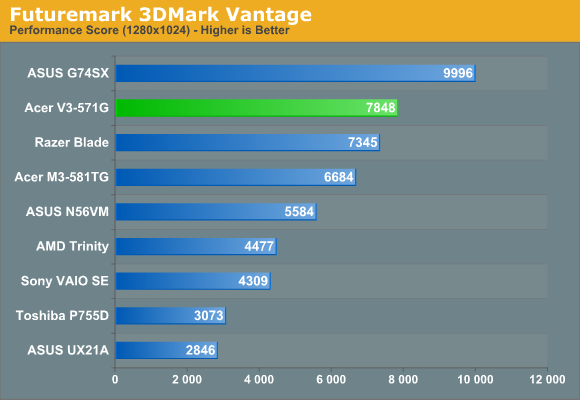
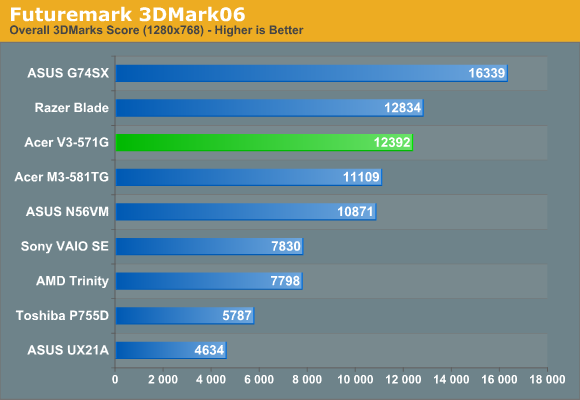
When we shift over to our more CPU- and GPU-centric tests, the performance results start to look more sensible. As one of two quad-core Ivy Bridge laptops, the Acer V3-571G takes second place in all four of our CPU-based tests, losing out by a small margin to the higher clocked i7-3720QM in the ASUS N56VM. The 3DMark scores tell a similar story, although this time it’s the GTX 560M in the ASUS G74SX that takes first place, with the GT 640M generally falling into second place and trading blows with the Razer Blade and Acer M3-581TG Ultrabook. The latter has the same GPU but a slower ULV Sandy Bridge processor, and we should hopefully have the updated M5 Ivy Bridge model in for testing in the near future.










88 Comments
View All Comments
JarredWalton - Wednesday, July 4, 2012 - link
"The average cost of all notebooks, which includes MacBooks, was $672 in February, lower than January’s mark of $724 but much higher than December’s $631 mark...."So actually, they're restricting some higher cost offerings (Apple products at the very least, possibly others?) in order to drive the average cost down, but they're not restricting the inclusion of netbooks. It looks like a purposefully lopsided statistic.
Regardless, what you get for $500 is less than half the CPU potential (lower clocked dual-core instead of quad-core), and about 1/3 the gaming potential. For the casual gamers and/or video types, the extra $250 to upgrade to something with specs like the Acer would improve the experience dramatically.
zorxd - Wednesday, July 4, 2012 - link
That's why I said windows laptop. Macs are obviously much more expensive. Apple had something like 90% of the $1000+ PC market 3 years ago. It must be even worse today as the average price of windows laptop fell."For the casual gamers and/or video types, the extra $250 to upgrade to something with specs like the Acer would improve the experience dramatically."
Of course. That's why gamers and those doing video editing buy high end laptops.
Randomblame - Wednesday, July 4, 2012 - link
it's an acer - if you type too fast that piss poor screen will fall right off it's hinges from the vibration. Build quality in acers is so awful you'd might as well buy something better that will actually last longer than a year - there is no value in something that simply does not last.JarredWalton - Wednesday, July 4, 2012 - link
While it's true that the build quality isn't exceptional, you're taking things too far. All the budget laptops from Dell, HP, Acer, Sony, Toshiba, Clevo, etc. all feel about the same to me. I have friends that purchased budget Acer laptops (and Dell, HP, etc.) that have worked fine for several years. I've had other friends with Acer/Dell laptops have an HDD failure after 18 months. Unless you're the type to routinely drop your laptop, though, I don't think Acer is going to fail within a year. My biggest concern is the long-term reliability of the motherboard, which unfortunately is impossible to gauge, but I suspect Acer's boards don't last nearly as long as higher quality laptops (e.g. ThinkPads).warisz00r - Thursday, July 5, 2012 - link
With that said, I have to point out that the general design (ports / vents layout etc.) of mid-range Windows laptops are quite similar across the brands, especially in OEMs from Taiwan. I suspect they outsource the design of these low-margin devices to the same ODM...jabber - Wednesday, July 4, 2012 - link
As in how long it took from very first switch on out of the box till you were able to properly use it?I've had some laptops in for customers that have been nearly two hours before they are usable.
First setup, install this crap and that crap, uninstall McAfee, install MSE, updates, burn the recovery DVDs etc. etc.
Also would be good to know how much crapware is installed and how long it took to remove it all etc.
Beenthere - Wednesday, July 4, 2012 - link
...i7 and Kepler. Sorry no sale.frozentundra123456 - Wednesday, July 4, 2012 - link
Why???i7 is far superior to AMD on the CPU side, and the new die shrunk nvidia cards seem fine to me.
warisz00r - Thursday, July 5, 2012 - link
Are you from the future?winterlude - Wednesday, July 4, 2012 - link
Jarred,Thanks for this review. I hate the compromises Acer makes, but I love the prices. Since I'm a value buyer, I find I get more use out of buying cheaper laptops more often than buying expensive laptops infrequently. I picked up two i3 Acer laptops in early 2011 for the equivalent price of a better made i5. Having 2 laptops gives me more resources. I basically buy acer for the specs--usually I cannot find a better performance/cost ratio. I try to focus on Acer's strengths and mitigate their weaknesses (i.e. screen quality and keyboard) by using external monitors/TV, keyboards, speakers etc. I use one laptop as an HTPC media center. I leave them on 24/7 and they tend to run hot; so laptop coolers are a must.
I would seriously consider the V3. Creating and rendering 1080p home movies in Windows Movie Maker would get a huge boost with this laptop, and I'd love to play Skyrim at higher res with smooth framerates. I'd likely upgrade to a 256GB SSD right away.
I am disappointed in how few Ivy Bridge non-Ultrabook laptops announced so far are sporting SSDs. I think every new laptop over $500 should at least incorporate an SSD cache. I think this might happen next year, and I'm curious to see what Haswell can do, and I expect SSDs to only get better and cheaper, so perhaps I will wait and see.